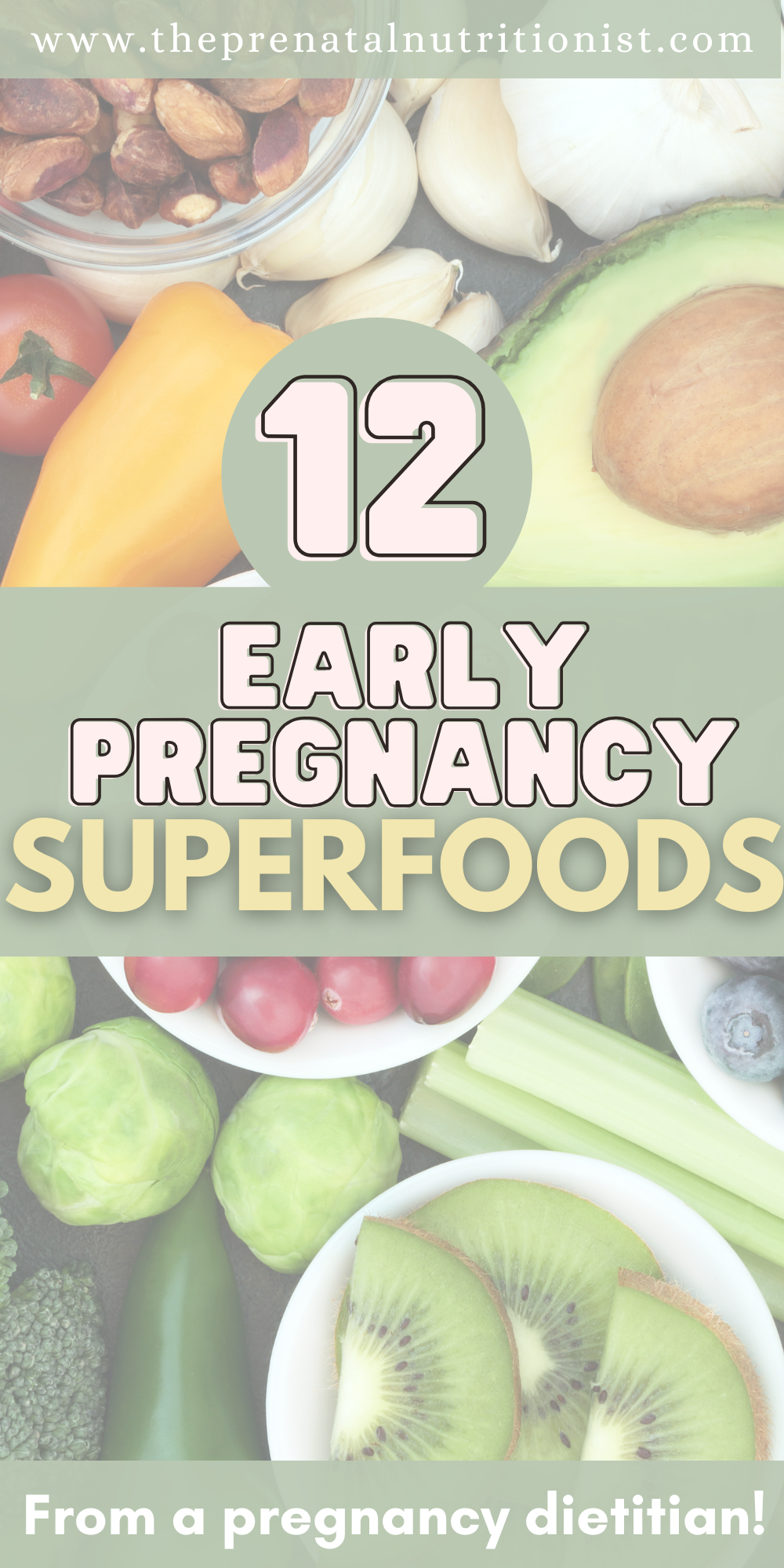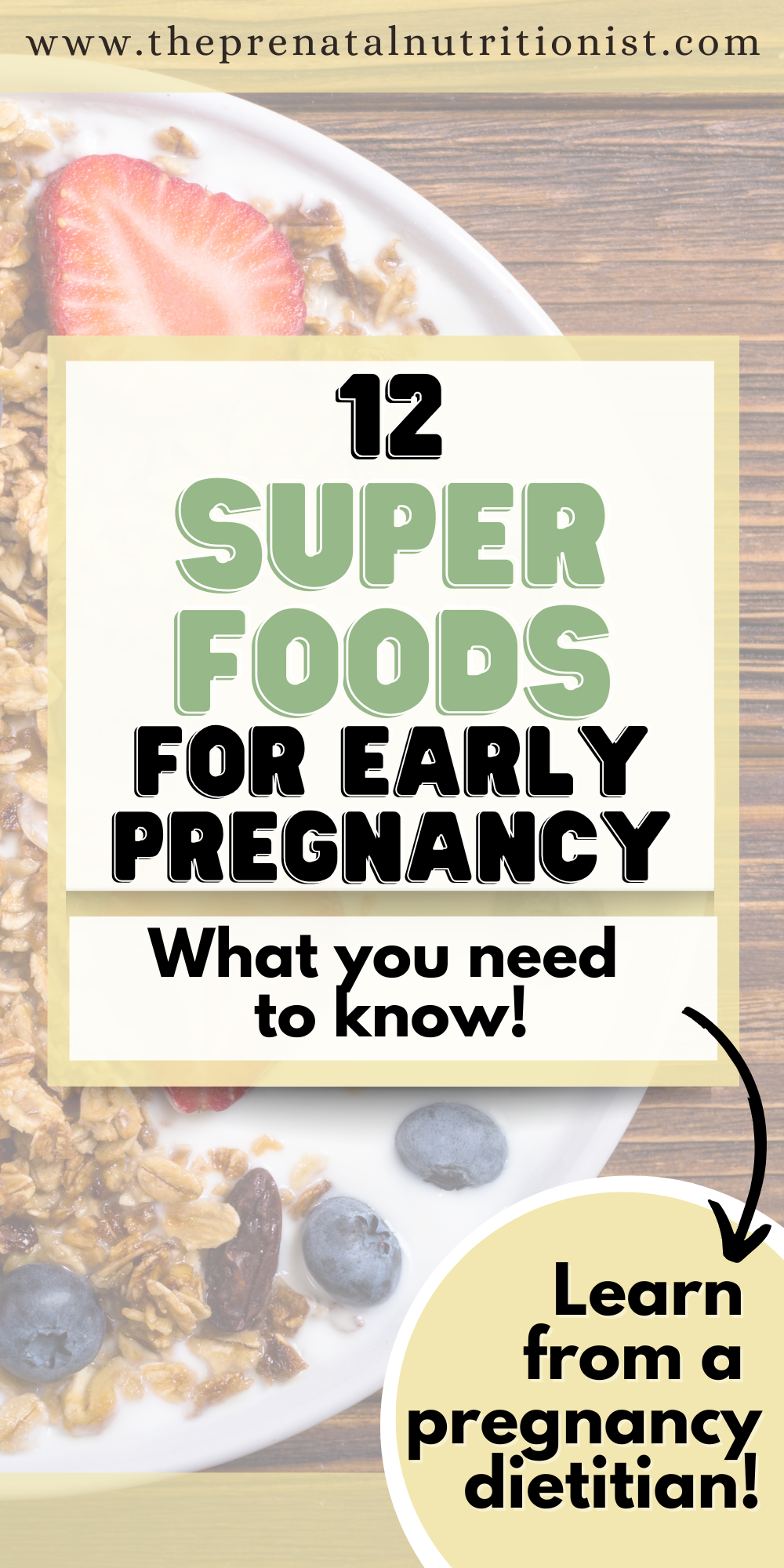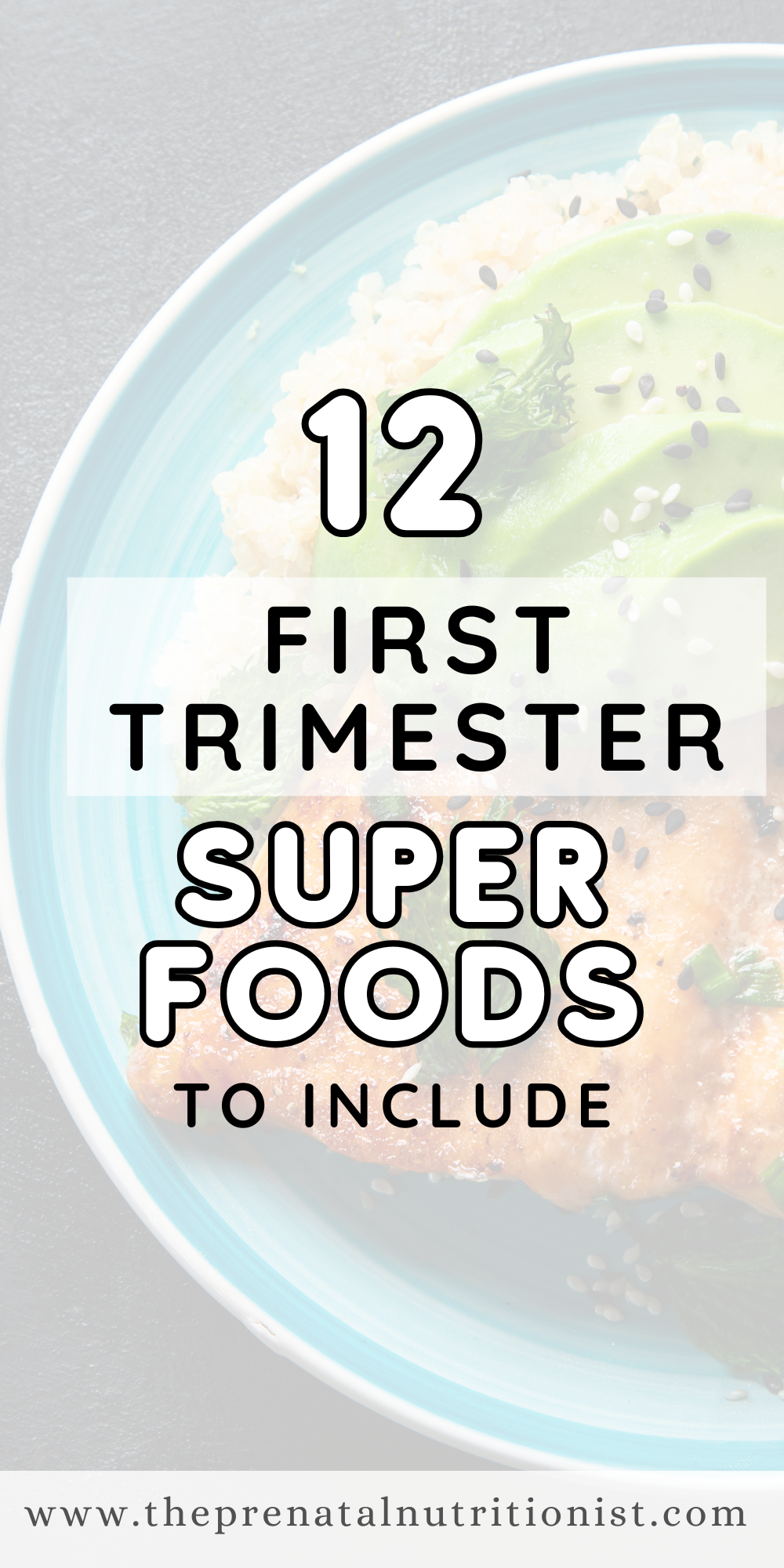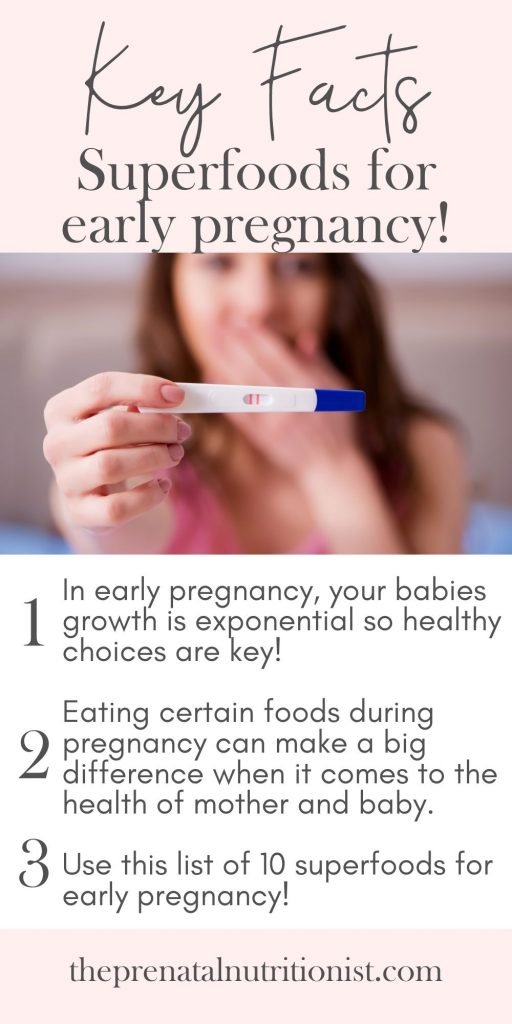
Welcome to the first trimester! This period is a crucial time during pregnancy. It’s the time when babies develop their major organs, their brain and spinal cord, and their eyes and ears. It’s also the point in time at which the baby’s blood cells begin to form and circulate.
In the first trimester, your baby’s growth and development are exponential. This is why it’s sooo important to ensure you’re getting the necessary nutrients to help your baby grow!
Eating certain foods during pregnancy can make a big difference in the health of mother and baby. Today I’m sharing a roundup of “superfoods” that are all great during those early days of pregnancy!
These handpicked foods have important nutrients for the beginning stages of growth and development, the nutritional needs of mother and baby during early pregnancy, and the reduction of symptoms (morning sickness, cramps, nausea) associated with the first trimester!
However, keep in mind that eating one “superfood” during pregnancy will not make or break you. Your overall diet matters most. You should also know that “superfood” is not a scientific term; it is generally used as a marketing term to promote foods that have high nutritional value.

12 Early Pregnancy Superfoods
Sweet Potatoes
Sweet potatoes have a multitude of benefits during pregnancy! They contain vitamins B, C, E, folate (the natural form of folic acid), manganese, magnesium, potassium, and sodium, contributing to proper fetal growth and development. Carbohydrate-rich foods are often better tolerated when morning sickness and nausea have kicked in. Sweet potatoes are a yummy, nutrient-dense carbohydrate choice to help combat morning sickness.
They are also a good source of vitamin A, in the form of beta-carotene, an important nutrient to support the mother and baby’s immune system. If you enjoy them, sweet potatoes are a great food choice to incorporate into your diet throughout pregnancy too!
Spinach
Leafy greens like spinach are an excellent folate source, a crucial nutrient in the first trimester. Folate, or vitamin B9, is one of the most essential building blocks of a growing baby’s tissues and nerves.
Folate is particularly important in the early stages of pregnancy because it is a key nutrient for preventing major birth defects in the baby’s brain and spine. Supporting your baby even before you become pregnant is really important because the neural tube begins forming immediately upon becoming pregnant.
Pregnant women should try to consume around 600 mcg DFE of folate each day. Just one cup of cooked spinach contains about 260 mcg of folate. Wow!
Dried Figs
Some common symptoms in early pregnancy are constipation, nausea, and an upset stomach. Some reasons include changes in hormones, iron supplements, and pressure from the uterus on your intestines. Luckily, fiber and fluids can be helpful for the management of constipation!
Dried figs, actually figs in general, are a rich source of both soluble and insoluble fiber, which can help keep expectant mothers regular and reduce constipation. Figs are also a good source of many nutrients, including vitamin A, magnesium, and vitamin C. If you’re battling constipation, consider including 3-4 figs during your next snack break!
Coconut Water
Coconut water is one of the best drinks for early pregnancy! This delicious beverage can help curb those sugar cravings, keep expectant mothers hydrated, and may even help to reduce blood pressure. Coconut water also contains potassium and magnesium, which aid fetal development by promoting healthy nerve signaling and reducing the chances of preeclampsia, respectively.
Coconut water is an excellent drink to help replenish the body and keep you hydrated. Stick to 1-2 cups of coconut water per day during pregnancy as drinking too much may have a laxative effect. Also, be sure to keep an eye out for added sugars or sweeteners in some options.
Bananas
Bananas are highly recommended during early pregnancy. This fruit is a super-rich source of vitamin B6, a nutrient known to help relieve or reduce symptoms of morning sickness, like nausea and vomiting. They also tend to be an easily tolerable carbohydrate choice when nothing else sounds good in the first trimester. Bananas are a great source of fiber, potassium, and vitamin C!
If you enjoy them, bananas can be part of a well-rounded diet that includes protein, fat, vegetables, and other colorful food choices throughout pregnancy! Bananas are delicious and nutritious and contain nutrients that help promote fetal growth and development. They also may help fight leg cramps that often pop up in the second and third trimesters!
Pistachios
Pistachios are a fantastic snack idea during pregnancy. They contain plenty of nutrients important for early fetal development, including vitamin B6. As discussed above, this nutrient may help reduce morning sickness symptoms. Eating pistachios during pregnancy may also help reduce the risk of developing gestational diabetes.
You can add pistachios as a garnish on salads for a colorful crunch, use them in a smoothie, add them to granola, or crush them up and use them as a breading on your favorite protein. Really, the options are endless when it comes to pistachios! If you don’t like pistachios, other nuts and seeds make great additions to a nutritious pregnancy diet too!
Pomegranate
Pomegranates contain many important nutrients to support a healthy pregnancy! They may also help reduce constipation, improve gut health, support the immune system, and may even reduce the risk of placenta damage. They also contain vitamin K, an important nutrient for the bone health of both baby and mother.
Pomegranate is a safe and delicious food to incorporate during pregnancy in the first trimester and after! Pomegranate is a delicious salad topping and also goes great with Greek yogurt or oatmeal! When cleaning and preparing fresh produce like pomegranate, always be sure to remember these key tips for ensuring food safety.
Greek Yogurt
Greek yogurt is an easy, delicious, and healthy breakfast idea for pregnant women, especially during the first trimester! In fact, Greek yogurt is an excellent source of protein and calcium, which are important for fetal development and the mother’s health. One serving of Greek yogurt provides a significant boost of both calcium and protein, with about 17 grams of protein and 187 mg of calcium per container!
Adequate calcium intake promotes strong bone development in the baby and protects the mother’s bones as the body grows and undergoes many changes. Protein is the building block of your baby and can help keep expectant mothers energized throughout the day!
Avocado
Eating avocado has many benefits in the first trimester and throughout pregnancy! It’s a good source of magnesium that may help to reduce morning sickness or replenish the body after morning sickness. Avocado is an excellent source of folate, too, which again helps reduce the risk of neural tube defects. Avocados also supply quality fats essential for fetal growth and development and heart health. It also delivers a good amount of fiber!
Avocado is a great healthy fat to incorporate throughout pregnancy. Wondering how to add avocado to your diet? Try making some delicious avocado toast and guacamole or simply adding some slices to your next salad or taco!
Salmon
Salmon is one of the best protein options to include during pregnancy. It’s rich in high-quality protein and an excellent source of DHA, an omega-3 fatty acid that plays a vital role in fetal brain and eye development. Omega-3s may also help reduce the risk of low birth weight by supporting healthy fetal growth.
Just one 3-ounce serving of salmon provides around 17 grams of protein and over 1,000 mg of omega-3s! It also contains essential nutrients like vitamin D, B12, and selenium, supporting immune function and maternal health.
For maximum benefit, aim to include salmon or other low-mercury fatty fish 2–3 times per week. Try it grilled, baked, or in salmon salad for an easy, nutritious meal!
Chia seeds
Chia seeds are a tiny but powerful addition to a healthy pregnancy diet, especially during the first trimester! They’re an excellent plant-based source of omega-3 fatty acids, but keep in mind you still need to consume other forms of omega-3 fatty acids that have DHA, not just ALA. Chia seeds also provide fiber, iron, calcium, and protein—making them a well-rounded nutrient boost.
Just one tablespoon of chia seeds offers about 5 grams of fiber, nearly 3 grams of protein, and key minerals like magnesium and phosphorus to support energy and bone health.
You can easily add chia seeds to yogurt, smoothies, oatmeal, or chia pudding for a simple, nourishing snack!
Ginger Tea
When it comes to morning sickness, ginger tea might be just the relief you’ve been looking for! Ginger tea is soothing, and studies show it can help reduce those pesky symptoms associated with early pregnancy, like nausea and vomiting. Ginger has many benefits beyond this, too. Some of these benefits include immune system support and aid in digestion!
If you don’t enjoy ginger tea, adding it to energy bites, granola, or a smoothie is also a great way to use it. If you’re considering a ginger supplement, be sure to consult with your doctor first.

Eating these foods during the first trimester is SO beneficial.
Eating a nutrient-dense diet throughout pregnancy is so important. During the first trimester, the baby and mother grow and change rapidly! As your baby’s cells become organs, tissues, eyes, and more, it’s crucial to supply the body with the necessary vitamins, minerals, and nutrients to support this growth. While many of the foods listed above are particularly helpful for the baby’s brain development and fighting those common early pregnancy symptoms, remember that there is no ONE superfood for pregnancy! Your overall diet is what matters most.
I hope this information is super helpful to everyone reading today, and I wish you the best of luck throughout your whole journey! For your one-stop pregnancy and postpartum nutrition hub, join The Prenatal Nutrition Library. TPNL will help you feel confident in your food choices for two during pregnancy and beyond. Available via our mobile app!








